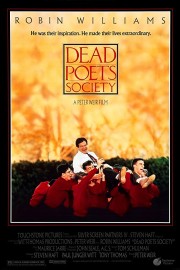Dead Poets Society
If I had seen Peter Weir’s “Dead Poets Society” in 1989, or even in high school or college, I feel as though it would be one of my very favorite films. The screenplay by Tom Schulman hits a lot of emotional buttons that should resonate with me, and definitely would have back then. It’s one of the challenges of seeing a movie with the reputation Weir’s does much later after its release for the first time, and really absorbing it. Does it stand up to the test of time, and weight of our expectations? Or does it feel like you’re missing something?
Schulman’s screenplay is inspired by his own time at preparatory school, and follows incoming classmates in their first semester at Welton Academy. They have all been sent there by well-off parents, or parents who want more for their children, as a stepping stone into an Ivy League education. While many of their classes will be perfunctory and “by the book,” however, they find their English class a bit different under the instruction of the new, young English teacher, John Keating (Robin Williams), who sees the importance of them learning poetry, but sees the way the textbook wants to teach it as missing the point. In an environment where conformity is demanded, Keating preaches individuality, following your own heart, and of course, that cannot be tolerated.
For many in my generation and younger, it will come as heresy that I’ve never seen “Dead Poets Society.” Well, I kind of feel like I might have, but just don’t really remember it, or it was in a situation where I could pay less attention than I probably should have. The truth is, though, my mother was not a big Robin Williams fan, and since she was who I would go see most movies with, I didn’t really engage with him a lot over the years unless she wanted to see a movie he was in, as well. I’m finally getting into his work in film that I’ve missed, though, and I definitely am grateful to have begun (in a matter of speaking) with this and “The World According to Garp” earlier this year. While his Keating has a lot of the Williams comedic persona in him, there’s also a lot of the humanity and quiet passion for life of his Garp that made that film such a revelation for me in moments with Ethan Hawke’s timid Todd Anderson and Robert Sean Leonard’s Neil Perry, whose father wants him to be a doctor, but who is passionate about acting. While I think “Garp” is both the better movie and the better performance from the late Williams, I’m glad that these two films are my first sort of entry point into discovering (or rediscovering) Williams’s career.
Throughout the film, Keating inspires his students to strive to find their own voice, but the thing that surprised me the most in the film was how little time was seemingly spent outside of Keating’s classroom, and how much time is spent with the kids as individuals, away from Keating, as the inspiration he instills in them takes hold. Sometimes, it can lead to absurd and foolish choices as made by Gale Hansen’s Charlie Dalton pranking the headmaster. Sommetimes, it can inspire some to follow their heart in the ways of love, as with Knox Overstreet’s pursuit of Chris Noel (Alexandra Powers). Sometimes, it’s about finding a voice in Todd, or following a dream like Neil, and one thing that, I think, really holds this movie strong is that it is very much more about the students than it is Keating. He is the catalyst, but not the driving force behind the movie, as it is sold. Weir finds that balance nicely, and gets strong work out of each member of the cast.
So, with all of this being said, why don’t I love this movie? I think it’s well-made, well-directed, and certainly well-acted. I think part of it is, while the movie definitely hits me emotionally where it needs to hit me emotionally, I don’t feel as though it does anything particularly unique to have the special distinction it has compared to other “inspiring teachers” films that it overshadows in its reputation. I also think part of it does boil down to if I had been watching it when I was a kid or young man vs. watching it while heading towards 41. Keating certainly “gets me,” as a character, but I’ve already done things that I work towards “seizing the day” in the way Keating inspires his students. Hell, you’re reading this review on an embodiment of this right now. I had that struggle, I’ve found that balance. I’m seizing the day as much as I can with my voice. I don’t need John Keating to get me there.










